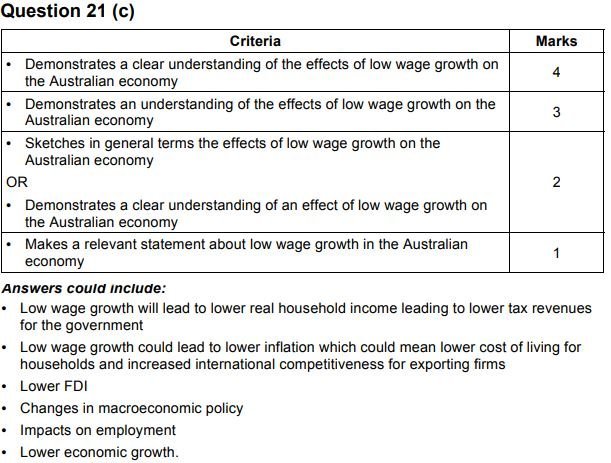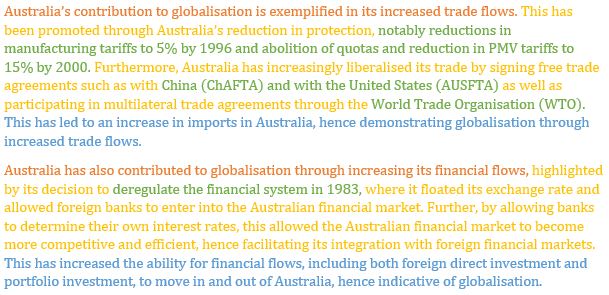As Short Answer Questions represent 40% of marks in the HSC Economics exam, the ability to nail HSC Economics Short Answer Questions is essential.
Whilst the two Section III and IV essays also combine to 40%, the amount of writing in those sections far exceed the amount for the HSC Economics Short Answer.
That means that every word you write needs to be precise, calculated and worthwhile.
Basically, every word counts.
That means that you will need to plan effectively and write with purpose, leaving the marker with no doubt but to award you all available marks.
Get more support on your Economics Short Answer Questions with HSC Economics Tutoring Sydney
Without further ado, let’s jump into the 5 steps to nail the HSC Economics Short Answer Questions Section!
Step 1: Study the Marketing Guidelines
Step 2: Learn Directive Verbs
Step 3: Follow DPEEL
Step 4: Edit Your Answer
Step 1: Study the marking guidelines
Every year, NESA will release the HSC paper shortly after the conclusion of its examination period.
Alongside, it will also release the marking guideline used by the markers at the Marking Centre, hence allowing you to get into the minds of the markers and see EXACTLY how marks are allocated. It is essential that you access these guidelines.
Here are the 2018 HSC Economics Marking Guidelines along with the 2018 HSC Economics exam paper
Let’s take a look at an example from Question 21(c) in the 2018 Economics Exam.
Explain the effects of low wage growth on the Australian economy. (4 marks)

In order to score a 4, the marker will need to demonstrate a ‘clear’ understanding of the effects of low wage growth on the Australian economy. While what constitutes ‘clear’ is subjective, you best position yourself for a full mark response by including as many RELEVANT details, ideas and points as possible. Looking at the sample answer,

We can see that rather than stating:
Low wage growth reduces household consumption.
The sample answer has expanded their argument and actually explained (related cause and effect) further impacts caused by low household consumption, explaining multiple ideas and perspectives:
Reduced household spending may also discourage production and investment by firms.
Step 2: Learn directive verbs
When answering short answers, it is crucial that you differentiate between your directive verbs and ACTUALLY do what is asked of you.
Simply writing everything you know about the concept is ineffective.
It often also takes up precious space in your answer booklet which could be better used answering the question.
The directive verbs for HSC Economics can all be found here!
Some common verbs used in Economics include:
Analyse: Identify components and the relationship between them; draw out and relate implications
Assess: Make a judgement of value, quality, outcomes, results or size
Describe: provide characteristics and features
Discuss: Identify issues and provide points for and/or against
Explain: Relate cause and effect; make the relationships between things evident; provide why and/or how
(Explain can also be asked as a ‘how’ question)
Evaluate: Make a judgement based on criteria; determine the value of
Outline: Sketch in general terms; indicate the main features of
Again, if you study the marking criteria you will see explicit differences in how a HSC Economics short answer question is marked depending on the directive verb used.
Step 3: Follow DPEEL
To provide a basic structure, follow DPEEL which will ensure you address all Economics elements in your response.
Definition: ensure you are defining the concept in the question to reflect your understanding. Can be integrated into the response and does not need its own sentence.
Point : attack the question and pinpoint what your answer to the question is, similar to a mini thesis.
Explain: provide further details that elaborate on your point. Depending on which directive verb you are asked, this is also where you can start to show a cause and effect (explain) or make a judgement (assess).
Evidence: responses may also require statistics or provide economic data in the question. Integrate this into your response to illustrate your explanation further and support your points.
Link: conclude your response by using a link to tie up all your points.
Again, let’s look at an example, this time using Question 23b) from the 2018 Economics Exam.
Explain how Australia has contributed to the process of globalisation. (6 marks)

In the example above:
- Point is in orange
- Definition and explanation is in yellow
- Evidence is in green
- Link is in blue
As can be seen, all sentences achieved some thing and had a purpose – nothing was wasted, which leads me to one of the biggest mistakes below…
Common Mistake: Repeating the question more than you need to!
A very common mistake I see students make is they take what teachers correctly advise them to by ‘answering the question’ with the words in the question – but they do too much.
In Short Answer you only have a limited space literally and figuratively to make an impression AND above all, provide enough depth to answer the question fully.
Just answer enough to establish a clear attack (mini thesis) and then LAUNCH into your point.
There is no need to rewrite the entire statement – this is a waste of time!
Step 4: Edit Your Answer
Finally, it is essential that you reread your answers to the HSC Economics short answer questions and edit them accordingly.
Below are THREE easy steps to help you refine and reinforce those responses.
Step 1: Check if you have answered the question fully.
This includes:
- A clear point and thesis sentence that states your answer to the question
- A qualified answer by using the correct modality (definitely, absolutely, to a limited extent, to some extent) or qualifier (somewhat, inconclusively, may)
Step 2: Included all relevant details and structured them logically.
This is supported using:
Transition signals (furthermore, hence, as a result, this leads to, but, however) These are ‘linking’ words which add logical sequencing to your DPEEL structure to create a sustained HSC Economics Short Answer response.
Step 3: Made explicit reference to economic data if it is included in the question (evidence in your DPEEL structure).
You will lose marks if you do not use the data provided.
A very general rule of thumb you can use as you write is to mentally ‘assign’ one mark to every idea. So long as each idea is not simply a repetition of an idea you have already written, this will help guide your response length and depth for your HSC Economics short answer questions.
Well, now that you have learned how to nail HSC Economics Short Answer questions, go on and practice!
Are you looking for some extra help with your HSC Economics Short Answer Questions?
We pride ourselves on our inspirational HSC Economics coaches and mentors!
We offer tutoring and mentoring for Years K-12 in a large variety of subjects, with personalised lessons conducted one-on-one in your home or at our state of the art campus in Hornsby!
To find out more and get started with an inspirational tutor and mentor get in touch today!
Give us a ring on 1300 267 888, email us at [email protected] or check us out on Facebook!
Terry Huang completed his Bachelor of Secondary Education with a Bachelor of Commerce at the University of New South Wales in 2018 and immediately jumped into teaching, with his students achieving some excellent HSC results including state ranks in Economics and an increase in the Band 6 rate by almost 50%. He has also been recognised by being listed on the UNSW Faculty of Social Sciences Dean’s List for Academic Excellence, as well as receiving the NSW Teachers Federation Future Teacher scholarship and the New Colombo Plan program. Terry enjoys listening to Kanye West, learning about cryptocurrency and travelling.


